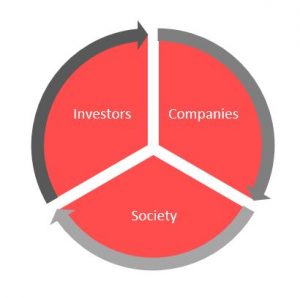Our Sampo Yoshi ESG Evaluation
The Alpha Japan “Sampo-yoshi” ESG evaluation methodology is our key sustainable indicator used to measure attainment of sustainable characteristics.
“Sampo-yoshi” has been the spirit of Japanese business traditions dating back to the Edo period. In Japanese, “yoshi” means “good”, and “sampo” means three sides. These three sides consist of the seller, the buyer and society. Successful merchants were adhering to this spirit by recognizing that they owed their business success to their communities and had to give something back, by investing in infrastructure and other social activities.
“Sampo-yoshi” sincerely wishes to contribute to solving social issues by not purely seeking to maximize corporate profits. This idea that business must benefit all people, not just the seller or the buyer, can be said to be the roots of today’s idea of sustainable investment.
The Alpha Japan “Sampo-yoshi” ESG evaluation methodology considers the three sides of investors, companies and society in line with that tradition to evaluate environmental and social issues.
By going beyond short-term business performance, this approach recognizes commitments that contribute to other parts of society at large, and would ultimately benefit the companies’ credibility. In particular, it integrates de-carbonization efforts into the corporate valuation which contains 4 axes:
1) Management capability
2) Business growth potential (e.g. innovation)
3) Business risk management
4) De-carbonization efforts
These topics are systematically discussed during the 500+ direct companies’ meetings conducted each year as part of our proprietary corporate research. Their progress is then monitored over time through successive follow-up interviews. Each of the 4 axes are rated through a 3-tier scoring system. With regards to 4) de-carbonization efforts, the bottom tier is considered below investment grade, and the company as not being aligned with the E/S characteristics promoted.
The proprietary Alpha Japan “Sampo-yoshi” ESG evaluation methodology is used to analyze and rate companies. Among others, this methodology measures a company’s de-carbonization efforts through pre-investment research checklist and on-going post investment monitoring, including the following de-carbonization focused data points:
- Scope 1, 2 and 3 CO2 emissions
- Power source ratio
- GWh per revenue
- Share of non-renewable energy consumption and production from non-renewable energy sources compared to renewable energy sources
- Exposure to excluded activities
Involvement in specific industries
Companies involved in controversial weapons i.e. companies that produce, trade or store controversial weapons (biological and chemical weapons, anti-personnel mines, cluster weapons, depleted uranium, white phosphorus) as defined by the United Nations conventions are excluded. With the exception of depleted uranium and white phosphorus, the production and use of such weapons has been banned or outlawed by international treaties, namely the Biological and Toxin Weapons Convention (BWC – 1972), the Chemical Weapons Convention (CWC – 1993), the Ottawa Treaty on landmines (effective 1999), and the Convention on Cluster Munition (Oslo Convention – 2008).
The following exclusion criteria are applied based on pre-defined thresholds:
- Fossil energy
- Oil & Coal Products
- Palm oil
- Tobacco
- Adult entertainment
- Gambling
- Material breaches of UN Global Compact Principles, the OECD guidelines for multinational enterprises, the UN guidelines principles on business and Human rights and their underlying conventions




